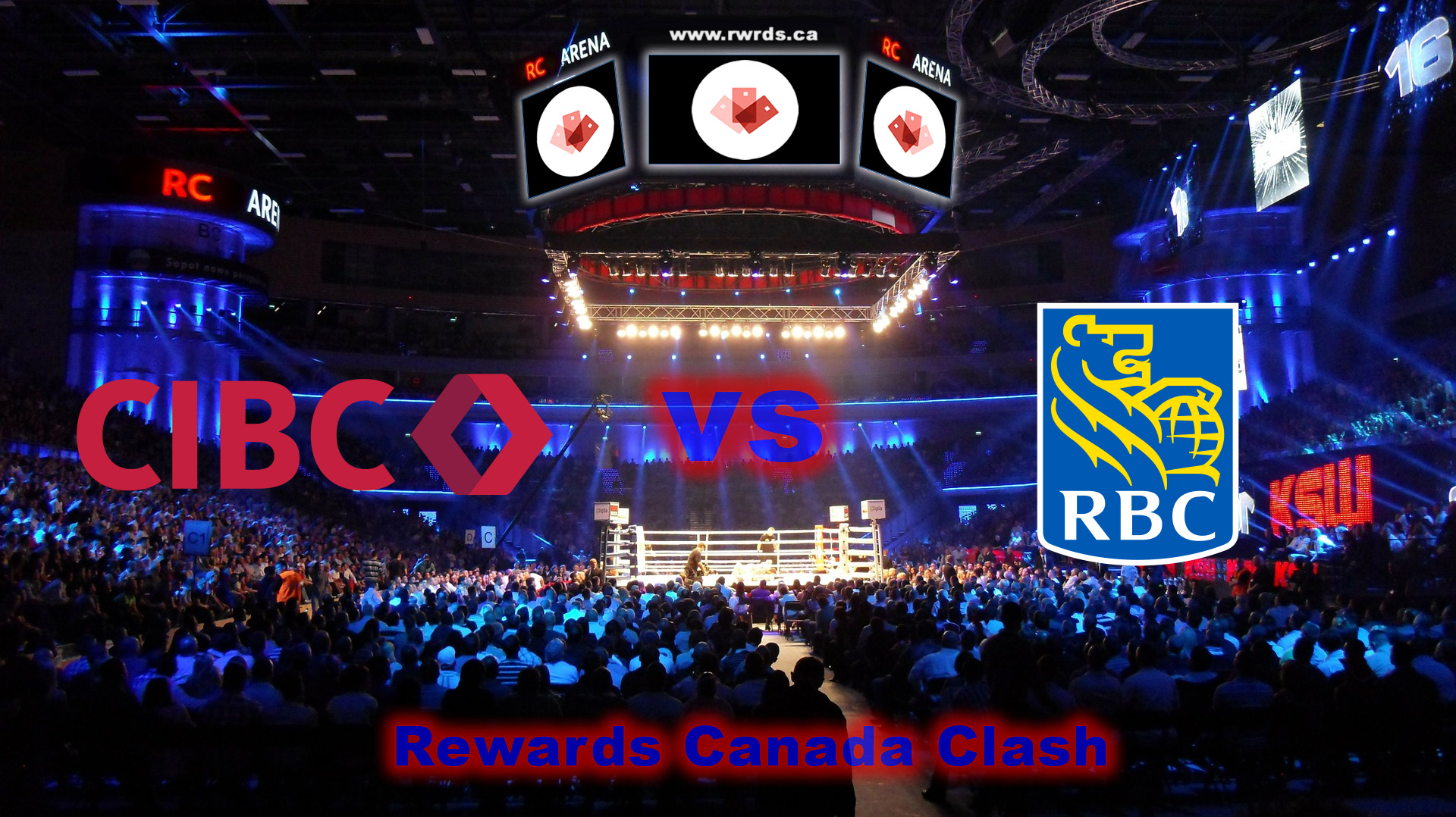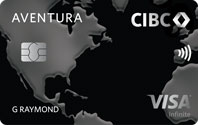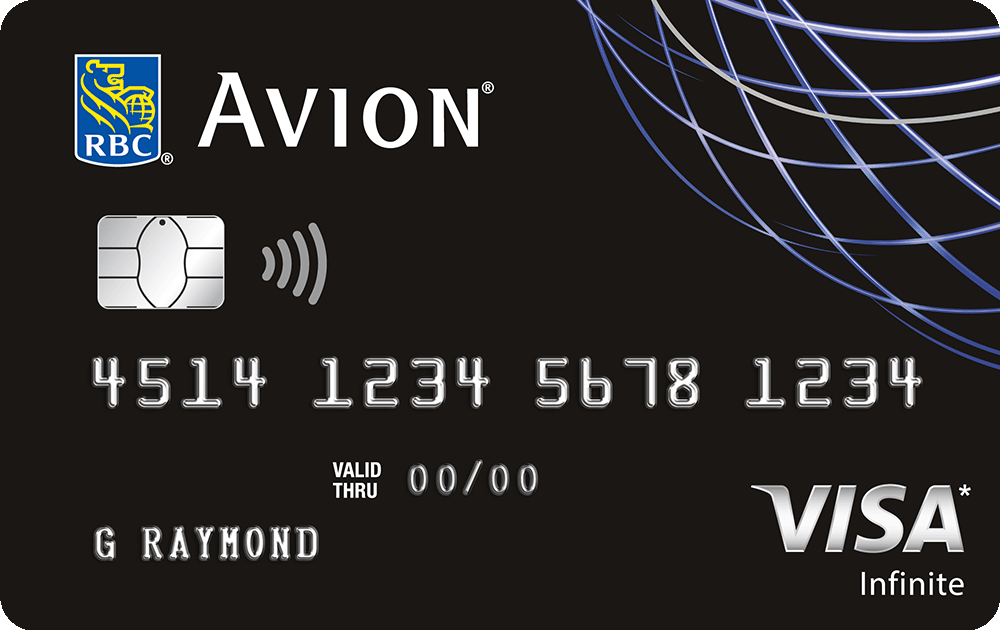Clash of the Reward Charts!
CIBC Aventura vs. RBC Avion
Last Updated on January 3, 2023

Welcome to another Rewards Canada Clash! Today's match up doesn't have us comparing credits cards head to head in our typical fashion where we compare all the benefits, earning etc. Instead,we have our second ever Clash of the Reward Charts! This is where we take the reward chart from two credit card issuers or reward programs and compare them against each other!
In this clash we have the CIBC Aventura Airline Rewards chart going up against the RBC Avion Airline Reward Chart in the RC Arena. When comparing reward charts it really comes down to a few simple factors - the earn rates, the redemption rates and the value offered between the two. It is absolutely critical you do this value comparison- you cannot look at one or the other on their own and make a decision or claim that one of the reward charts is better.
With that being said, both CIBC and RBC have numerous card options with a variety of earn rates. Thus, to be sure the contenders are as equal as possible going into the RC Arena we will be using their most popular cards for the comparison. Those cards are the CIBC Aventura® Visa Infinite* Card and the RBC Avion Visa Infinite Card
Now onto the clash!
Comparing the redemption rates
When you look at the requirements on the redemption charts, they appear quite similar. At first glance CIBC looks to have the upper hand on the shorter haul flights while RBC appears to provide more value on the longer haul flights.
| Flight Redemption | Amount of points needed with the CIBC Aventura Airline Rewards chart | CIBC Maximum Ticket Value | Amount of points needed with the RBC Avion Reward Chart | RBC Maximum Ticket Value |
|---|---|---|---|---|
| Short Haul - Canada Within or to an adjacent province or state | 10,000 to 20.000 | $400 | 15,000 | $350 |
| Canada/US Long haul (Except Hawaii or Alaska) | 25,000 to 35,000 | $800 | 35,000 | $750 |
| Sun Destinations - Western Canada/U.S. to Mexico, Hawaii, Alaska - Eastern Canada to Bermuda, Central America, Caribbean (this is from the RBC chart) |
40,000 to 60,000 | $1,000 | 45,000 | $900 |
| Sun Destinations - Eastern Canada/U.S. to Mexico, Hawaii, Alaska - Western Canada to Bermuda, Central America, Caribbean (this is from the RBC chart) |
40,000 to 60,000 | $1,000 | 55,000 | $1,100 |
| Europe | 50,000 to 70,000 | $1,300 | 65,000 | $1,300 |
| Rest of world | 75,000 to 125,000 | $2,000 | 100,000 | $2,000 |
What makes the comparison somewhat difficult is CIBC providing a range of points for each redemption category. If the ticket you are purchasing is quite a bit lower than the maximum price you'll redeem less points and when the ticket price approaches the maximum ticket value you'll be redeeming at the higher points rate. For example, if you are looking at a ticket to Singapore that costs $2,000, RBC seems to be the better option at only 100,000 points versus CIBC's 125,000. Same for Europe and the ever so popular with Canadians, sun destinations. But only comparing this part of the two credit card's reward options can prove to be an expensive mistake. Continue on reading the next section to learn why.
Subscribe to our newsletters
Be sure to subscribe to the Rewards Canada News and RWRDS Bonus Bulletin email newsletters so that you don't miss out on any loyalty program news and offers! You can subscribe to our newsletters here:
Comparing the earn rates (required spending)
Now when you look at both sides of the equation there is a whole different story to be told. Let's look at what it takes in actual credit card spending (your points earning) to get each card's rewards.
Let's set the stage between the CIBC Aventura® Visa Infinite* Card and the RBC Avion Visa Infinite Card by looking at their earn rates.
The CIBC Card earns 2 points per dollar on travel booked via CIBC Rewards and eligible purchases made on Apple.ca. Then it earn 1.5 points per dollar spent on gas stations, grocery stores and drug stores. Any other spending will earn 1 point per dollar spent.
The RBC Avion Visa Infinite Card earns 1 point per dollar spent on all purchases except travel where it earns 1.25 points per dollar.
So let's see how that plays into how much you have to spend to get your flight rewards via these charts:
| Flight Redemption | Amount of points needed with the CIBC Aventura Airline Rewards chart | Amount of points needed with the RBC Avion Reward Chart | Amount of Spend Required with the CIBC Aventura Visa Infinite Card | Amount of Spend Required with the RBC Avion Visa Infinite Card |
|---|---|---|---|---|
| Short Haul - Canada Within or to an adjacent province or state | 10,000 to 20.000 | 15,000 | $5,000 to $20,000 | $12,000 to $15,000 |
| Canada/US Long haul (Except Hawaii or Alaska) | 25,000 to 35,000 | 35,000 | $12,500 to $35,000 | $28,000 to $35,000 |
| Sun Destinations - Western Canada/U.S. to Mexico, Hawaii, Alaska - Eastern Canada to Bermuda, Central America, Caribbean |
40,000 - 60,000 | 45,000 | $20,000 to $60,000 | $36,000 to $45,000 |
| Sun Destinations - Eastern Canada/U.S. to Mexico, Hawaii, Alaska - Western Canada to Bermuda, Central America, Caribbean |
40,000 to 60,000 | 55,000 | $20,000 to $60,000 | $44,000 to $55,000 |
| Europe | 50,000 to 70,000 | 65,000 | $25,000 to $70,000 | $52,000 to $65,000 |
| Rest of world | 75,000 to 125,000 | 100,000 | $37,500 to $125,000 | $80,000 to $100,000 |
Let me pose this question to you: Would you rather spend $5,000 versus $12,000 to get a short haul flight? Or how about $25,000 versus $52,000 to get a flight to Europe? I think you may be starting to get the picture. Yes, that's only looking at the highest earn rates for travel purchases on either card and the lowest redemption rate for CIBC but that example is not out of the question as it is achievable.
So to alleviate all the potential confusion and options let's take travel purchases out of the equation since those can vary a lot and we'll also only look at redeeming for flights at the maximum ticket value. This means for CIBC we'll be taking the higher points redemption requirement.
Let's go back to that short haul flight in Canada. CIBC requires 20,000 points for a ticket with a maximum value of $400. RBC requires 15,000 points for $350. RBC also allows you to redeem points at 100 points to $1 which means you could technically redeem 20,000 points for a $400 ticket. The cards seem pretty even at this point but RBC will require $15,000 in spending for a $350 ticket and $20,000 for a $400 ticket. With CIBC you can get that $350 ticket for as little $13,333 in spending (redeeming 20,000 points for $350) or that same $13,333 for a $400 ticket. We say as little as $13,333 with CIBC as that will be determined by your spending habits and how many points you earn at the 1.5 points rate. Given that 1.5 points is for groceries, gas and drug stores, there's a good chance many of those points were earned at that rate and you would end up spending less than what you would on the RBC card.
Next, we'll look at a longer haul sun destination flight, lets say Toronto to Cancun that costs $1,100. CIBC requires 60,000 points for a $1,000 flight while RBC requires 55,000 points for $1,100. Just as RBC in the above example, CIBC will let you redeem 100 points to $1 so we can bring the ticket value up to $1,100 to match RBC with 10,000 more CIBC Rewards points. This means you could spend as little as $46,667 on the CIBC card to have the 70,000 points for this flights while RBC requires $55,000 in spending. Again, with CIBC your spending habits will determine how little or how much you have to spend to get that ticket.
What about a flight to Asia? Both cards allow a maximum ticket price of $2,000 before taxes. RBC requires 100,000 points or $100,000 in spending to get this ticket. CIBC has the higher requirement of 125,000 points which you can earn with as little as $83,333 in spending. Again, the CIBC card can get you that ticket with less spending if your shopping habits allow you to earn most of your points at the 1.5 points rate. However, if you are someone who doesn't have any grocery, gas or drug store purchases then RBC is the way to go for these longer haul flights. Sorry, I shouldn't actually say 'is the way to go' but rather 'could be the way go' The next section will clarify that!
CIBC's advantage
Above I mentioned RBC could be the way to go for long haul flights. This is based on those maximum ticket values and not taking into consideration CIBC's better earn rates. However, for most Canadians you would be earning those 1.5 points on at least some purchases that in the very end would make the earn and burn value between the CIBC and RBC Infinite cards pretty equal. But then CIBC has an advantage and that's the range of points required for redemption. If you are not buying a ticket at the maximum ticket price and it is actually quite a bit below that level, CIBC will require less points. This is crucial on those long haul flights, especially for travel to Europe.
Ticket pricing to Europe and Asia can be very deceiving as the full price tends to be broken down as a very low base fare and are supplemented with very large carrier surcharges. Both CIBC and RBC's reward charts only cover the base fare. They don't cover the carrier surcharges, taxes or fees. So when you see an economy class flight to Europe priced at $1,000 in all likelihood the base fare is $400 or less, the rest are surcharges, taxes and fees. And unfortunately both programs will require you to pay cash or extra points for those surcharges, taxes and fees.
If we take that $400 base fare amount, CIBC may only require the lower points requirement of 50,000 points or as little as $33,333 in spending. RBC no matter what will charge the full 65,000 points or $65,000 in spending. You could almost get two tickets with CIBC for the same amount of spending that would only get one ticket with RBC. Even if CIBC required the higher 70,000 points per their chart which is as little as $46,667 in spending.
Conclusion & the winner
Our second reward chart clash definitely has the competitors more closely matched than our first one. Our first Clash of the Reward Charts had American Express Membership Rewards deliver a big knockout blow to RBC Avion Rewards and unfortunately this next match in the RC Arena also leads to a loss for RBC. I wouldn't say it's a knockout for CIBC, in fact the RBC chart holds up pretty well but in the end CIBC's accelerated earn rates of up to 2 points per dollar and variable redemption rates should work better for the majority Canadians in regards to spending less to earn those rewards.
The winner of this clash is: CIBC Aventura Airline Rewards Chart
Latest details and offers for these cards:
CIBC Aventura® Visa Infinite* Card
Welcome Offer: Join and get up $1,350 in value including a first year annual fee rebate!†
Annual Fee $139 | Additional Cards (Up to 3): $50 | Annual interest rate 20.99%† on purchases and 22.99%† on cash advances and 22.99% † on balance transfers | $60,000 personal or $100,000 household annual income †
- Here's how You can get up to $1,350 in value:
- Get a total of up to 35,000 Aventura Points (up to $800 in travel value†) during your first year:
- 15,000 Aventura Points when you make your first purchase†
- 20,000 Aventura Points when you spend $3,000 or more in net purchases in the first 4 monthly statement periods†
- Get a one-time annual fee rebate ($139) for you (the primary cardholder) and up to three authorized users ($50 each): up to $189 value.†
Elevate your airport experience with 4 complimentary visits at 1,200+ lounges globally through Visa Airport Companion Program: up to $261 in value.†
- Plus, get a NEXUS◊ Application Fee rebate†: A $67 value†
- 2 Points for every $1 spent on travel purchased through the CIBC Rewards Centre†
- 1.5 Points for every $1 spent at eligible gas stations, EV charging, grocery stores and drug stores†
- 1 Point for every $1 spent on all other purchases†
- Save on gas with CIBC and Journie Rewards
Link and use your CIBC Aventura Visa Infinite Card with Journie Rewards to save up to 10 cents per litre† at participating Pioneer, Fas Gas, Ultramar and Chevron gas stations.†
Plus, enjoy extra valuable travel benefits
- Travel when it’s right for you – your Aventura Points don’t expire
- Redeem your Aventura Points for more than travel with our Shop With Points/Pay with Points features
- Travel local - Aventura Points can be redeemed for more than just flights – use your points for hotels and car rentals for a weekend getaway
- This offer is not available for residents of Quebec.
- Click here to apply for the CIBC Aventura® Visa Infinite* Card
This is a digital-exclusive offer.†
To be eligible for this offer:
1) this offer must have been directly communicated to you from CIBC or from a partner/affiliate; and
2) you must apply for the eligible card through the link provided in the CIBC or partner/affiliate communication to you.†
This offer is reserved for you. Please do not forward it to anyone else.
CIBC may approve your application, but you are not eligible to receive this Offer if you have opened, transferred or cancelled another Aventura card within the last 12 months.†
† Terms & Conditions Apply. The information for the CIBC Aventura® Visa Infinite* Card has been collected independently by Rewards Canada. The card details on this page have not been reviewed or provided by the card issuer.
RBC Avion Visa Infinite Card
Get up to 55,000 Avion points^ (a value of up to $1,100†), that’s enough to fly anywhere in North America or the Caribbean!
Annual Fee: $120 | Additional Card Fee: $50 | 20.99% on purchases 22.99%* on cash advances and balance transfers *21.99% if you reside in Quebec.
- Earn 1 Avion point for every dollar you spend* and an extra 25% on eligible travel purchases.
- When you are ready to travel again, Avioners can book flights with points on any airline, on any flight, at any time, early or last minute, with no blackout periods or restrictions.
- Avioners earn points that never expire so your points will be waiting for your next adventure.
- Redeem your points for travel and more. Use points for anything from paying bills and paying your card balance to redeeming for Gift Cards and Merchandise at top brands like Apple. The Avion Rewards program gives you the freedom of choice to use your points your way, and helps you make the most as an Avioner.
- Eligible Avion Rewards members can also convert points to other loyalty programs including WestJet Points, British Airways Avios points and Hudson’s Bay Rewards points.
- Link your RBC card with a Petro-Points membership to instantly save 3₵ per litre on fuel at Petro-Canada stations and earn 20% more Petro-Points and 20% more Avion rewards points
- Link your RBC card with a Rexall Be Well account and get 50 Be Well points for every $1 spent on eligible products at Rexall. Redeem Be Well points faster for savings in store on eligible purchases where 25,000 Be Well points = $10
- Get access to RBC offers which provides access to earn points faster at specified brands
- Extensive insurance including: mobile device insurance, travel insurance (trip cancellation, interruption and emergency medical) and other eligible purchases to protect you and your family
- Avioners get access to luxury Visa Infinite benefits including first in line for exclusive events, and hotel and dining benefits.
- Up to a 2.3% return on your spending depending on which reward ticket you book
- Get $0 delivery fees for 12 months from DoorDash17 - Add your eligible RBC credit card to your DoorDash account to:
• Get a 12-month complimentary DashPass subscription18 – a value of almost $120
• Enjoy unlimited deliveries with $0 delivery fees on orders of $15 or more when you pay with your eligible RBC credit card
Corresponding legal references and product terms are available on the RBC website, which will be available and agreed upon in the customer onboarding process.

